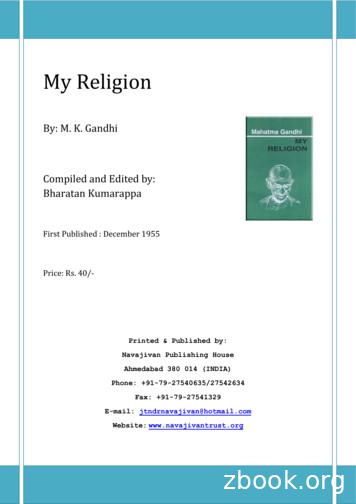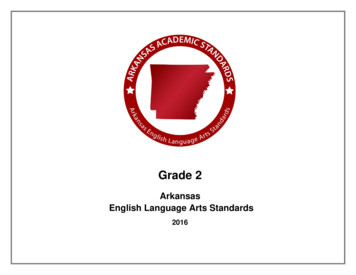Teens And Religion - Seventh-day Adventist Church
CHM Leadership CertificationLevel III, Course #9Teens and ReligionLinda Mei Lin Koh, GC Children’s Ministries(Handouts)Why Do We Need to Understand Teens? (Barna) Teens largely define the values and leisure endeavors of the nation.The economy is substantially shaped by their choices as consumers and their workhabits in the work force.The nature of the family depends on how teens prioritize family and approachparentingThe future of the Church will be determined by their faith commitments.Samuel Pfromm Netto, Psychology of Adolescence, 307.“Adolescence is an age where the individual is concerned with what is spiritual andsacred.”Religious Needs of Teens They need to have a good relationship with religious authorities, such as parents andteachers so that they can see in them coherence between what they live and what theypreach. They need to have correct concepts regarding religion at this time on their own so thatthey opt for the faith in Jesus.Myths about Teens and Religion Many think teenager do not like/are not even interested in religion. Studies have shown that “adolescence is an age where the individual is concerned withwhat is spiritual and sacred.” It’s true that this phase of teenage life produces radical transformations not only in theform of confronting the relationship with God, but with all aspects of their life. The individual is no longer a child, so that by himself, he may discover manner andforms of living and religion that was taught to him.Teenage is the Best Phase of Life for Religion Religious concepts gain more precision and depth in the final years of childhood andduring puberty. It is the best phase of life to strengthen the values of religion and a relationship withGod.1
What is the Teenager’s Response? It is because that through their nature the adolescent is a reformer of the world andreligion does not escape their criticism. (45) The problems that they have with religion are not because of religion itself, but becauseof poor models of parents and religious leaders. They want a more authentic religion of reflection, with less routine, and moreawareness.” (46)Key Factors in Teens’ Response Positive response to religion depends on the role models exhibited by parents and theindividuals who affect the religious life of the child and the adolescent.” (317) The rebelliousness of the teen toward religion is a form of rebelling against the peoplewho desire to impose upon them religion which they themselves many times do notpractice.Religious paradox for the teen He wants religion. He is concerned with spiritual matters. He desires the security thatreligion gives to the human being but He rejects it, distances himself from it, becomes critical, hard and inflexible because ofwhat he sees and lives within it.What separates the teen from religion?Roger Dudley, a North American educator, states that there are three things that leadthe teen to abandon the church.1. The quality of the interpersonal relationships between teens and those who exercisereligious authority over them (parents and teachers).2. Inconsistency between what is professed as belief and what is lived.3. Concepts that teens have regarding religion.What separates the teen from religion?Roger Dudley, a North American educator, states that there are three things that lead the teento abandon the church:1. The quality of the interpersonal relationships between teens and those who exercisereligious authority over them (parents and teachers).2. Inconsistency between what is professed as belief and what is lived.3. Concepts that teens have regarding religion.Religion, Identify and Independence2
One of the most important tasks of adolescence is obtaining independence, emotional as wellas economic. This implies reaching a sense of identity. One key question for the teen is: “Whoam I?.” When the young teen establishes differences between himself and his parents, he canreach the point of not accepting some values and customs adopted by them, as a meansof seeing himself as a person with his own identity.If parents or other authority figures understand the necessity and the nature o f the processof emancipation, they can really help with intelligent and understanding guidance. But if theyfight against the process, trying to impose their value system on the teen, not allowing him toobtain a separate identity, the result can be: Rejection of religion.Are Teens Really Rejecting Religion? Teens are not directly against religion, but against the authority which sustains religion. Such rebellion is the personal method of the young person to free himself from therestrictions that hinder him from obtaining a separate personality. Therefore, the more rigid and authoritarian that the form of applying religious authoritybe, especially when it is combined with severity and impatience, the more the teen willreject religion.The National Study of Youth and Religion1. Religious Participation Teens are relatively actively in religious organizations and activities. Teens attend Sunday school, church, or youth groups, pray and study the Bible.The National Study of Youth and Religion2. Theological Beliefs Teens are like to hold many traditional Christian religious beliefs. Majority of teens believe in God, afterlife, angels, miracles, demons, judgment.The National Study of Youth and Religion3. Christian Religions Beliefs Teens from conservative denominations more likely than mainline teens to hold thesereligious beliefs.The National Study of Youth and Religion4. Importance of Faith Majority of teens report that their religious faith is very important in their lives. Most of them have shared their faith with someone not of their faith & have had greatworship experience.The National Study of Youth and Religion5. Evaluation of Churches3
Majority of teens express relatively positive views of their churches and fellow churchmembers.They would continue going to church if given the choice & that their church is warm &welcoming.4
What Makes a Church Appealing?1. People are friendly & care about each other2. A Community with genuine relationships, supportive & family- oriented3. High quality teaching & preaching4. Theological beliefs and doctrine of the church5. Quality of programs and classes for children6. The church being involved in helping poor and disadvantaged peopleBarna’s Advice for Youth Leaders Understand the world of the teenager—the cultural context of the young person. Readtheir magazines, watch their TV shows talk to them Enter with a Worldview—integrate your faith into their practical life. Teens areimpacted by your modeling. Enter with a philosophy & clear vision of why you are engaged in youth work. Pray daily for the development of teens. Find resources that help you to be effective.George Barna’s Advice for Parents Searching for Meaning – most teens go through a search for significance, seeking todiscern meaning, purpose and truth inlife. Parents should not force aworldview or philosophy of life upon young individuals, but they can provide keyinsights and connections that will help them see life from a different vantage point.Ask questions, clarify with them and encourage.5
Define Appropriate Values – Parents who live in accordance with a consistent andChristian value set have a much greater chance of seeing those values absorbed bytheir children and teens than do parents who leave it to chance and hope for the best.Discussing these choicesis only one element in the process; demonstrating whatthey look like, in practice, is the most powerful influence.Family Connection – Most teens want to feel as if they are part of a family that knowsthem, loves them and will look out for them. Parents mustprovide focusedleadership to family members; have a vision for what kind of family they want to haveand the strategies it will take to facilitate such a family experience. Make acommitment to the sacrifices it will take to achieve this vision.Faith Connection – The keys to successfully passing on faith from one generation toanother relate to making faith central to one’s existence, avoiding lifestyle hypocrisyand integrating faith behaviors and values into everything the family does as a unit andas individuals.Conclusion The teen is open to religion. He/she is vulnerable. He/she is an inquirer, he does notaccept everything that he is told, he wants proof, he wants to see, but he is receptive. Itis a great phase of life. A great opportunity to make a vulnerable decision for Jesus. Satan has taken advantage of this phase to destroy the life of God’s children. The Church has slept while the hungry wolf takes its children.What Can Be Done? A specific ministry to work with teens. We cannot waste this phase. If we maintainthem in Christ at this age, the possibilities that they will remain in Him for their entirelife is very great. Tomorrow can be too late!References George Barna, Real Teens (Ventura, CA: Regal Books, 2001) Philip Schwadel & Christian Smith, “Portraits of Protestant Teens: A Report onTeenagers in Major U.S. Denominations (Chapel Hill, NC: National Study of Youth andReligion (NSYR), 2005.) Roger Dudley, Why Teenagers Reject Religion and What to Do About It (Hagerstown,MD: Review and Herald Publishing Association, 1978). Roger Dudley, The Complex Religion of Teens (Hagerstown, MD: Review and HeraldPublishing Association, 2007). Samuel Pfromm Netto, Psychology of Adolescence (Sao Paulo: Pioneira, Brasilia, INL,1976.6
forms of living and religion that was taught to him. Teenage is the Best Phase of Life for Religion Religious concepts gain more precision and depth in the final years of childhood and during puberty. It is the best phase of life to strengthen the values
Choose Health Action Teens Being a Choose Health Action Teen is a great opportunity for teens. They can gain leadership and teaching skills, learn about healthy eating and active play, and have fun with other teens and younger children. But before teens can benefit from the CHAT experience, we have to find and convince teens to be a CHAT. This .
Many teens have scary memories or dreams about trauma. Some teens also feel jumpy or nervous or angry. After trauma, a lot of teens watch out for danger and worry about bad things happening. Some teens also have trouble sleeping and paying attention in school. A lot of teens feel like they DON'T want to talk about or think about the trauma(s .
religion. However, religion cannot be defined except by the characteristics by which are found wherever religion itself is found.4 Nevertheless, the one aspect of religion that must be agreed upon, and is required to remotely be considered as religion, is that it is a belief system held by a group of
FAMILY AND RELIGIOUS STUDIES SYLLABUS (FORMS 1 – 4) 9 Religion and the Liberation Struggle-Chimurenga/Umvukela Religion, Rights and Social Responsibility Religion and Conflict management 7.0 SCOPE AND SEQUENCE 7.1 TOPIC 1: RELIGION SUB-TOPIC FOR M 1 FORM 2 FORM 3 FORM 4 Concept of Religion Definition, types and c haracteristics of religion Different religions in Zimbabwe .
Religion which takes no account of practical affairs and does not help to solve them, is no religion. Young India, 7-5-'25, p. 164 Every activity of a man of religion must be derived from his religion, because religion means being bound to God,
Religion in the Schools Task Force guided this initiative.6 Overview of Guidelines Part One addresses why it is important to teach about religion, and Part Two outlines ways to teach about religion in constitutionally sound ways. Part Three is an overview of approaches to teaching about religion
Curriculum Guide Revised December 2017. Course Offerings Department 9th 10th 11th 12th Religion Religion 1 Religion 2 Religion 3 Religion 4 Religion 4/ Leadership . Freshmen will become familiar with the Common Application to understand the elements considered by colleges for admission.
Grade 2 must build on the strong foundation of Grades K-1 for students to read on grade level at the end of Grade 3 and beyond. Arkansas English Language Arts Standards Arkansas Department of Education























